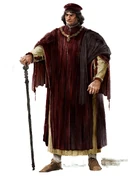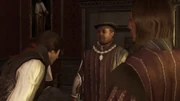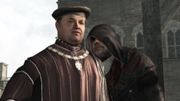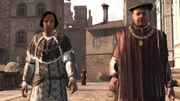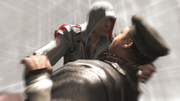Slate Vesper (talk | contribs) mNo edit summary |
Tag: Visual edit |
||
| Line 26: | Line 26: | ||
===Auditore execution=== |
===Auditore execution=== |
||
{{Quote|In the absence of any compelling evidence to the contrary, I am bound to pronounce you guilty.|Uberto to Giovanni.|Assassin's Creed II}} |
{{Quote|In the absence of any compelling evidence to the contrary, I am bound to pronounce you guilty.|Uberto to Giovanni.|Assassin's Creed II}} |
||
| − | Some time later, [[Ezio Auditore da Firenze]] stumbled upon Uberto in Giovanni's office, where his father and the Gonfaloniere were conversing about something urgent; Ezio was dismissed by Giovanni before he could understand their discussion. Soon after, Giovanni |
+ | Some time later, [[Ezio Auditore da Firenze]] stumbled upon Uberto in Giovanni's office, where his father and the Gonfaloniere were conversing about something urgent; Ezio was dismissed by Giovanni before he could understand their discussion. Soon after, Uberto warranted the arrest of Giovanni, Federico, Petruccio, and Ezio for the crime of treason. However, Ezio was running errands for his father when the guards arrived and therefore managed to evade arrest. After visiting Giovanni in prison, he ordered Ezio to deliver a letter to Uberto containing incriminating evidence of the conspiracy against the Medici family, to which Ezio complied. |
[[File:LMS 1 v.png|thumb|250px|left|Uberto at the Auditore execution]] |
[[File:LMS 1 v.png|thumb|250px|left|Uberto at the Auditore execution]] |
||
Once Ezio arrived, Uberto asked the young Florentine noble if he would like to stay at his house, presumably with the intent of murdering him, though Ezio declined. Moments before Ezio left, he caught a glimpse of a shadowy figure, who was in fact Rodrigo Borgia – the man behind the events that were yet to come. |
Once Ezio arrived, Uberto asked the young Florentine noble if he would like to stay at his house, presumably with the intent of murdering him, though Ezio declined. Moments before Ezio left, he caught a glimpse of a shadowy figure, who was in fact Rodrigo Borgia – the man behind the events that were yet to come. |
||
| − | + | Afterwards, on the day of the execution at the [[Piazza della Signoria]], Giovanni angrily reminded Uberto of the evidence that had been given to him by Ezio which proved his family innocent, though Uberto purposely claimed that he had no recollection of such evidence, before sentencing the three to death. |
|
At the sight of their demise, Ezio ran towards the stage with his sword, claiming that he would kill Uberto for what he had done, but a [[Brutes|Brute]] [[Guards|guard]] disarmed him before he was able to get close enough. However, on the urging of some of Giovanni's friends, a [[Thieves|thief]] and a [[Courtesans|courtesan]], Ezio fled from the scene. |
At the sight of their demise, Ezio ran towards the stage with his sword, claiming that he would kill Uberto for what he had done, but a [[Brutes|Brute]] [[Guards|guard]] disarmed him before he was able to get close enough. However, on the urging of some of Giovanni's friends, a [[Thieves|thief]] and a [[Courtesans|courtesan]], Ezio fled from the scene. |
||
Revision as of 01:09, 8 September 2014
- "As Gonfaloniere it is my duty to ensure that the city of Firenze remains a shining beacon of justice. Corruption and its ilk shall find no purchase here so long as I am in control."
- ―Uberto Alberti, on his role as Florence's Gonfaloniere, 1476.[src]
Uberto Alberti (1416 – 1476) was the Gonfaloniere of Florence during the Renaissance, and a member of the Templar Order. Despite his reluctance, Uberto turned against his former allies Lorenzo de' Medici and the Auditore family.
Before his defection, Uberto was close friends with Giovanni Auditore da Firenze, though he personally authorized the arrest and execution of Giovanni and his family by order of the Templar Grand Master, Rodrigo Borgia, in exchange for the promises of his own family's financial wellbeing.
Biography
Early life
- "According to the history books, this guy was a saint."
- ―Shaun Hastings, regarding Uberto Alberti.[src]
Uberto Alberti lived in Florence for most of his life, and was a well-known and respected lawyer, with a majority of the prosecutions he made being successful, despite the fact that his legal skills were entirely self-taught. During his time as a lawyer, the Medici bank evicted his family, which made him thirst for revenge against the Medici family.
From this resentment, he came into contact with the Templars, who promised to give him what he desired in exchange for his cooperation. With this, Uberto agreed, and secretly conspired with them after his election in the Signoria, to which he began making ties with the Medici to gain Lorenzo's trust.
Working with the Medici
Uberto advised both Giovanni and Lorenzo on certain matters, and was involved in an interrogation of one of Rodrigo Borgia's men regarding the pre-planned assassination of Galeazzo Maria Sforza. He was put in charge of decoding a letter Giovanni had intercepted in Venice, though after it was deciphered by Antonio Maffei, Uberto disposed of it as part of his agreement.
Uberto then had a copy of the letter created in its pre-deciphered state. From there, he then passed on the letter to Giovanni and had him deliver it to Rome, in the Assassin's hopes of following the conspirator's trail. After the near escape of Rodrigo Borgia from Giovanni in Rome, Uberto was among those called to a meeting held by the Spaniard. Taking part alongside the other Templars, Uberto was informed that Giovanni had to be disposed of in order for their plans to succeed.
Auditore execution
- "In the absence of any compelling evidence to the contrary, I am bound to pronounce you guilty."
- ―Uberto to Giovanni.[src]
Some time later, Ezio Auditore da Firenze stumbled upon Uberto in Giovanni's office, where his father and the Gonfaloniere were conversing about something urgent; Ezio was dismissed by Giovanni before he could understand their discussion. Soon after, Uberto warranted the arrest of Giovanni, Federico, Petruccio, and Ezio for the crime of treason. However, Ezio was running errands for his father when the guards arrived and therefore managed to evade arrest. After visiting Giovanni in prison, he ordered Ezio to deliver a letter to Uberto containing incriminating evidence of the conspiracy against the Medici family, to which Ezio complied.
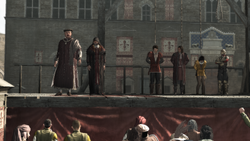
Uberto at the Auditore execution
Once Ezio arrived, Uberto asked the young Florentine noble if he would like to stay at his house, presumably with the intent of murdering him, though Ezio declined. Moments before Ezio left, he caught a glimpse of a shadowy figure, who was in fact Rodrigo Borgia – the man behind the events that were yet to come.
Afterwards, on the day of the execution at the Piazza della Signoria, Giovanni angrily reminded Uberto of the evidence that had been given to him by Ezio which proved his family innocent, though Uberto purposely claimed that he had no recollection of such evidence, before sentencing the three to death.
At the sight of their demise, Ezio ran towards the stage with his sword, claiming that he would kill Uberto for what he had done, but a Brute guard disarmed him before he was able to get close enough. However, on the urging of some of Giovanni's friends, a thief and a courtesan, Ezio fled from the scene.
Upon his escape from the guards, Ezio met up with the Auditore housemaid Annetta, who directed him to go to her sister's house, near to the Duomo. Once there, Annetta's sister, Paola, taught Ezio the skills necessary to elude attention and assassinate Uberto, and kept his mother and sister safe until he had managed to do so.
Death
- Uberto: "You would have done the same, to save the ones you love."
- Ezio: "Yes, I would. And I have."
- —Uberto's final moments, 1476.[src]
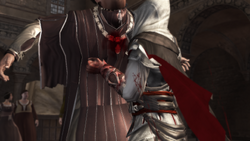
Ezio killing Uberto in a fit of rage
After a few days of training Ezio, Paola tracked down Uberto's location so that Ezio's act of vengeance could take place. Following this, Ezio followed Uberto to the Santa Croce cloister, where he was attending an art exhibition of Andrea del Verrocchio.
There, Uberto conversed with Lorenzo de' Medici about the executions, and subsequently insulted him on his way to the exhibition. After Ezio had dispatched the guards patrolling the courtyard of Santa Croce, Uberto spoke with various attending nobles, who lauded him for the executions. Afterwards, Uberto noticed Ezio's approach, but was too shocked to call the guards.
Seizing the opportunity, Ezio brutally killed Uberto with the Hidden Blade, stabbing him multiple times in the chest. Accompanying this, Ezio avenged his father and brothers' death, and proclaimed to everyone in attendance that the Auditore were not dead, with himself being alive and that his family's legacy lived on through him.
Personality and characteristics
Uberto was a confident man whose belief in himself and his power bolstered on becoming an ally of the Templars. Even so, all of his actions were manipulated by Rodrigo Borgia, who promised Uberto the wealth that he required to keep his family secure.
Because of this, Uberto carried out any of Rodrigo's demands, never defying him, even when he was asked to execute his close friend's family. However, Uberto kept his true allegiances to himself, never sharing it with the family he loved and cared for, in the hope that the cost for keeping them safe outweighed his guilt for his betrayal.
Trivia
- According to the Animus database, Uberto was not a Templar. However, Mario Auditore identified him as one when pressed by his nephew.
- During Uberto's database video, it could be seen that four ropes hung on the gallows in front of the Palazzo della Signoria, instead of the three shown in-game. Presumably, this fourth rope was meant for Ezio. The same picture has the Auditore in a different order, wearing slightly different clothes, hung above the stage, not dropped below it.
Gallery
Reference

